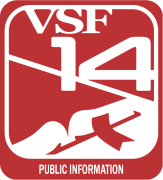VSF 14.01: BEECN Volunteer
FEMA Community Lifeline icon
Summary
BEECN volunteers operate in organized cohorts, perform regular equipment checks, participate in drills, and deploy communication nodes (BEECNs) 24–48 hours after a major earthquake.
A Basic Earthquake Emergency Communication Node (BEECN) Volunteer plays a vital role in disaster response by establishing communication between neighborhoods and Portland’s Emergency Operations Center (EOC) in the aftermath of a major earthquake. Volunteers assist at designated BEECN sites to relay critical information, such as scene stabilization information, emergency requests, and damage reports, using durable communication systems.
BEECN Volunteers are the only PBEM volunteers who can be a NET volunteer or an ATV but are indemnified by the City of Portland either way.
Responsibilities
- Deploy to assigned BEECN sites within 24–48 hours following a major earthquake.
- Set up communication equipment, including handheld radios and tents, at BEECN locations.
- Relay and log emergency messages between the public and emergency responders via radio.
- Conduct periodic checks and inventory of BEECN caches to ensure readiness.
- Participate in scheduled training, drills, and activation exercises to maintain operational competence.
- Represent PBEM professionally and follow safety and operational guidelines at all times.
- Log all volunteer hours.
| Position ID ※ | VSF 14.01: BEECN Volunteer |
| Mission Area ※ | Preparedness | Response | Recovery |
| Lead Agency ※ | Portland Bureau of Emergency Management |
| Active NET Required? ※ | No; this position is available to ATVs. |
| Structure ※ | The BEECN Volunteer is part of a BEECN Cohort, and the BEECN Volunteer reports to the BEECN Coordinator for their assigned BEECN. |
| Relevant Knowledge, Skills, Abilities ※ | Leadership, radio, communication. Ability to remain cool headed in intense situations. First aid is also helpful, but not as important as the other skills listed. |
| Licenses and Certifications ※ | None required. |
| Currency ※ | BEECN volunteers must be in touch with their BEECN Coordinator and appear on the roster of their BEECN Response Framework. They should also participate in BEECN inventories and exercises as their time allows. Because all BEECN volunteers are indemnified, they are required to log their hours but not required to meet the Minimum Service Contribution (MRC) unless they are also a NET volunteer.
BEECN Volunteers are required to complete a criminal background check at the same frequency as NET volunteers. |
| Physical Requirements | A BEECN volunteer must be inside a 20-minute walk or bike ride of the BEECN they are assigned to. They should be able to access BEECN equipment from storage and move it to the BEECN site with the assistance of at least one other person. |
| Task Book ※ | None at this time. |
| PPE and Recommended Equipment ※ | PPE: Weather appropriate clothes. BEECN volunteers should wear the hard hats and vests found in their BEECN cache when conducting BEECN operations.
Equipment: All the equipment a BEECN volunteer needs should be in their BEECN Cache. |
| Forms ※ | BEECN Response Framework |
| Updated ※ | 2025.01.10 |
| Released ※ | 2017.10.03 |
| Training or Resource | Type | Delivery | Duration | Learning Objective |
|---|---|---|---|---|
| Basic BEECN Training | Required | Online | 1.5 hours | |
| IS-100: Introduction to the Incident Command System | Optional | Online | 2.0 hours | |
| Crowd Management | Optional | Online or in-person | 2.0 hours | |
| Mental Health Crisis De-escalation | Optional | In-person | 3.0 hours | |
| IS-242: Effective Communication | Optional | Online | 8.0 hours | |
| IS-2901: Introduction to Community Lifelines | Optional | Online | 1.0 hours | |
| First Aid (certification) | Optional | In-person | 6.5 hours | |
| Mental Health First Aid (certification) | Optional | Online or in-person | 9.0 hours | |
| Basic NET or CERT (certification) | Optional | In-person | 24 hours | |
| Portland Basic Emergency Operations Plan (BEOP) | Supplemental | Online | N/A | |
| The Oregon Resilience Plan Executive Summary | Supplemental | Online | N/A | |
| BEECN Guidelines | Supplemental | Online | N/A | |
| BEECN on Tumblr | Supplemental | Online | N/A | |
| BEECN video content | Supplemental | Online | N/A |

